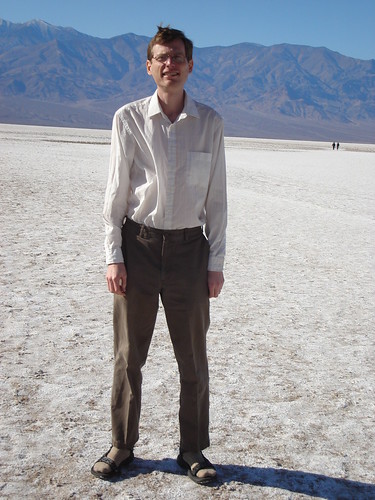Many good comments regarding supporting advertising on Wikipedia (or not) here and also on Slashdot and other blogs. I may further characterize and respond to these in aggregate (see the update to my first post for some of this). For now I want to call out or respond to a few particularly worthy comments and criticisms.
Evan Prodromou’s comment:
One thing I wanted to respond to was that a couple of people seemed to think it incorrect on my part to refer to Wikipedia’s Web traffic as a “resourceâ€. I’m not sure what else to call a potential source of tens, maybe hundreds of millions of dollars annually in income. But if people know a better word for it, please substitute that in.
Let me also point out that wikipedia.org’s current huge Web traffic is not a long-term sure thing. As Open Content, the encyclopedia can be copied onto any other Web site on the Internet, and sites like answers.com show that this can be lucrative. Anyone familiar with the Open Directory (http://dmoz.org/) knows that it’s copied to Google Categories, Yahoo Directory, and dozens of other high-profile sites. In 5 years, will there be thousands of mirrors of Wikipedia on the Web? Will wikipedia.org become more like editors.dmoz.org — an editorial interface for a data set served from many other servers?
If that’s the case, will we look back on the high-traffic days of 2005-2008 as the time when we wasted somewhere around half a billion dollars in potential revenue? Will the WMF really be glad at that point that it did so?
I hadn’t thought of this scenario and don’t consider it likely, but do think it is an important consideration. I think the canonical dmoz.org was seriously disadvantaged in two ways Wikipedia is not — a fairly closed editorial process (e.g., I’ve applied a few times over the years and don’t recall getting any feedback, not even rejection) and probably a horrible editor interface (e.g., I was accepted as an editor at Chef Moz, a sister site of dmoz.org — and ran away screaming).
How could Wikimedia sites lose traffic to copies? Presumably much of Wikipedia traffic comes from Google. If Google published a branded copy (with ads of course) and promoted it in (or above) search results, Wikipedia would presumably lose lots of traffic (and many people would call Google evil for it, at least for awhile). I’m sure there are more creative scenarios in which Wikimedia sites lose traffic.
Peter McCluskey:
Mike Linksvayer has a fairly good argument that raising X dollars by running ads on Wikipedia won’t create more conflict of interest than raising X dollars some other way.
Almost. The second X is Y and an order of magnitude or so smaller than X. McCluskey:
But the amount of money an organization handles has important effects on its behavior that are somewhat independent of the source of the money, and the purpose of ads seems to be to drastically increase the money that they raise.
I can’t provide a single example that provides compelling evidence in isolation, but I think that looking at a broad range of organizations with $100 million revenues versus a broad range of organizations that are run by volunteers who only raise enough money to pay for hardware costs, I see signs of big differences in the attitudes of the people in charge.
Wealthy organizations tend to attract people who want (or corrupt people into wanting) job security or revenue maximization, whereas low-budget volunteer organizations tend to be run by people motivated by reputation. If reputational motivations have worked rather well for an organization (as I suspect the have for Wikipedia), we should be cautious about replacing those with financial incentives.
It’s possible that the Wikimedia Foundation could spend hundreds of millions of dollars wisely on charity, but the track record of large foundations does not suggest that should be the default expectation.
Yes, this could be a major problem. As I said last year, “[advertising] could fund a staggering Wikimedia Foundation bureaucracy, or it could fund additional free knowledge projects.” The possibility that new funds will not be used effectively lowers the expected benefit of running ads. Two items give me some confidence that the Wikimedia Foundation would be less susceptible to waste than the average foundation:
- Wikimedia Foundation’s history of transparency sets the tone for what would become a much larger organization
- An incomparable set of watchdogs (Wikipedians)
Regarding subversion of current volunteer motivations and ethics (which is really the point of McCluskey’s post), I would not advocate financial incentives for functions currently carried out by volunteers, certainly not any content-related function. Of course given large amounts of money there would be pressure to convert an ever larger group of volunteers into employees, regardless of what advocates of advertising on Wikipedia might have wanted. The possibility that this would occur and go badly should also weigh against advertising.
Addressing this possibility, I concur with Per Abrahamsen’s recommendation segregating Wikimedia projects and foundation funding of compatible projects:
Wikipedia is clearly able to earn its own money, begging for donations on the front (and every other) page is an insult to both visitors, and to the many worthy cases that are not in that lucky position.
So I support advertising on Wikipedia.
The adds should be non-intrusive, textual, clearly separated from content, and selected algorithmically, similar to the adds known from Google.
However, if the money are really that big (more than the current need), additional precautions would have to be taken. The most important would be to split the foundation into two, with watertight boundaries between. One that ran the current Wikimedia projects, and another solely responsible for distribution the ad-money between causes that promote the goals of the foundation, but had no say in the running of any of the projects. Money do corrupt, hence the separation.
Slashdot commenter FooAtWFU (and others) suggested that the real problem with advertising is that large numbers of contributors would leave in protest, seriously damaging Wikipedia. I doubt it. A very vocal minority would raise hell and some of them would leave, at least temporarily. I suspect most contributors would not even notice the presence of ads. I conjecture that Wikipedia contributors, however superior some may feel, are not that different from MySpace “contributors” (who seem not to be deterred by gratutous advertising). In a relatively short time (a year is my wild guess) a majority of contributors would have become contributors after advertising had begun. Such is the nature of a rapidly growing site.
A 2002 fork of Spanish Wikipedia (Enciclopedia Libre) could be interpreted as evidence in either direction. The fork apparently occurred in part due to “our rejection of censorship, of an editorial line, and of including advertising.” Whatever the merits of these claims, article counts show the fork growing more quickly for about a year and a half. From 2004 on Spanish Wikipedia grew much more quickly and currently is over five times the size of Enciclopedia Libre. So the loss of those ideologically motivated against advertising and perhaps with other complaints could be seen as a terrible blow to Spanish Wikipedia (a year or more delayed progress) or no big deal, considering current relative sizes. Is there any reason to think the proportion of Spanish Wikipedians disgusted by advertising is significantly different than that of any other language?
Of course it is possible if Wikipedia had taken ads in 2002, many more may have left, and perhaps the fork would now be five times the size of the parent instead of vice versa. This would not necessarily be a horrible thing. After all, the two sites (and any potential Wikipedia fork) use the same license, so work done on one is not entirely lost to the other.
This does suggest an experiment however — run ads on Spanish Wikipedia and see how many contributors move to Enciclopedia Libre. The existence of the latter would make it both easier for ad objectors to move and easier to determine who had moved, indicating a probable maximum negative impact on contributions to other Wikipedias, should they run ads, as no other language has an alternative as viable as Enciclopedia Libre — at least not viable for those who hate ads! The largest encyclopedic wikis outside Wikimedia run Google AdSense, e.g., WikiZnanie (Russian) and Susning.nu (Swedish).
 The January 13-19 Economist has a review of (and my first encounter with) Philippe Legrain‘s book Immigrants: Your Country Needs Them. The title and the review make the book sound a bit wishy-washy, but a review in the Guardian, reprinted on Legrain’s site makes it sound much better.
The January 13-19 Economist has a review of (and my first encounter with) Philippe Legrain‘s book Immigrants: Your Country Needs Them. The title and the review make the book sound a bit wishy-washy, but a review in the Guardian, reprinted on Legrain’s site makes it sound much better.